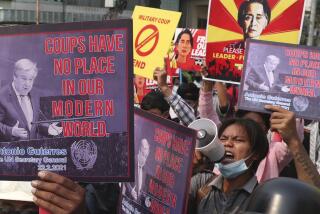Criticized for criticism
- Share via
WASHINGTON — As Myanmar’s aid crisis deepens, the Bush administration is facing criticism that its denunciations of the military regime may have contributed to its resistance to allowing foreign aid workers to enter the storm-ravaged country.
After Tropical Cyclone Nargis pounded Myanmar, First Lady Laura Bush and administration officials condemned the government Monday as illegitimate, blasted its human rights record, and charged that it had failed to give its residents adequate warning of the storm’s approach.
The next day, in a move that was certain to sharpen tensions between Myanmar, also known as Burma, and the U.S., President Bush presided at a ceremony awarding the Congressional Gold Medal to the regime’s archenemy, detained democracy activist Aung San Suu Kyi.
Critics said the administration’s harsh comments were poorly timed and risked reinforcing the government’s suspicions of the outside world and undermining the humanitarian effort.
“For the humanitarian purpose, you have to put politics aside and say unequivocally that we want to help,” said Joel Charny, vice president for policy at Refugees International, a Washington-based advocacy group. “We know the Burmese generals are going to be suspicious. We shouldn’t be taking an approach that’s going to make it more likely that backs get up and doors remain closed.”
A senior United Nations official, who declined to be identified because of the sensitivity of the issue, said, “It is certainly not helpful.”
The government, despite pleas from international leaders and aid groups, continues to tightly restrict the entry of relief workers and foreign officials. It has allowed entry to only about a dozen relief aircraft, a tiny number for a country where, by the U.N.’s estimate, about 1.5 million people may be in jeopardy. The first U.S. craft, a C-130 military cargo plane, is scheduled to land Monday.
White House officials denied that comments by top administration figures have set back the relief effort. But as the week progressed, the rhetoric appeared to cool.
Wednesday, Stephen Hadley, Bush’s national security advisor, noted the Myanmar government was blocking the entry of nearly all international aid workers, not just those from U.S. agencies. But he refrained from further criticism, saying, “I don’t want to politicize this.”
The episode is not the first time that the Bush administration has drawn controversy with what many consider its selective condemnation of governments for a lack of human rights and democracy.
The administration spoke out for democracy in the Middle East at the end of Bush’s first term, but backed off substantially amid complaints that its efforts were upsetting nondemocratic U.S. allies and threatening stability.
Bush and other top administration officials continue to speak out about some countries, especially smaller nations or those whose cooperation in international projects is less vital, such as Iran, Syria, Belarus and Myanmar.
U.S. officials have long been at odds with the Myanmar government, widely considered one of the most corrupt and repressive in the world. The Bush administration has pursued a policy of isolation and sanctions against the country, which Secretary of State Condoleezza Rice has called an “outpost of tyranny.”
The administration recently denounced the regime for planning a constitutional referendum, set to start today, that U.S. officials contend is a fraudulent attempt to give its rule legitimacy.
Laura Bush has taken a personal interest in Myanmar and has acted as a government spokesman on the issue. In her comments Monday, she accused Myanmar officials of failing to notify the public of the storm’s advance, even though they knew of it.
“We already know that they are very inept,” she said at a rare news conference.
Asked about Laura Bush’s comment that the government had failed to warn the public, Australian Foreign Minister Stephen Smith said, “I just don’t think we’re in a position to make that sort of judgment now given the difficulties of communication. The priority now is rendering assistance to thousands of displaced people who urgently need our assistance.”
News websites frequented by Myanmar emigres quoted readers indignant that, in their view, Laura Bush seemed to be offering aid conditioned on the government putting off the referendum.
“She is insulting us,” wrote a blogger identified as Moke Him Kha on the Asia Observer website.
Sen. John F. Kerry (D-Mass.), who led an effort to pass a bipartisan Senate resolution urging aid to Myanmar, cautioned against renewing criticism of its rulers.
“It is not clear how criticizing the military junta right now helps convince them to allow urgently needed assistance for the Burmese people,” Kerry said.
“The only goal right now should be getting help to the people of Burma, however we need to do it.”
--
--
Times staff writer Maggie Farley at the United Nations contributed to this report.
More to Read
Sign up for Essential California
The most important California stories and recommendations in your inbox every morning.
You may occasionally receive promotional content from the Los Angeles Times.











